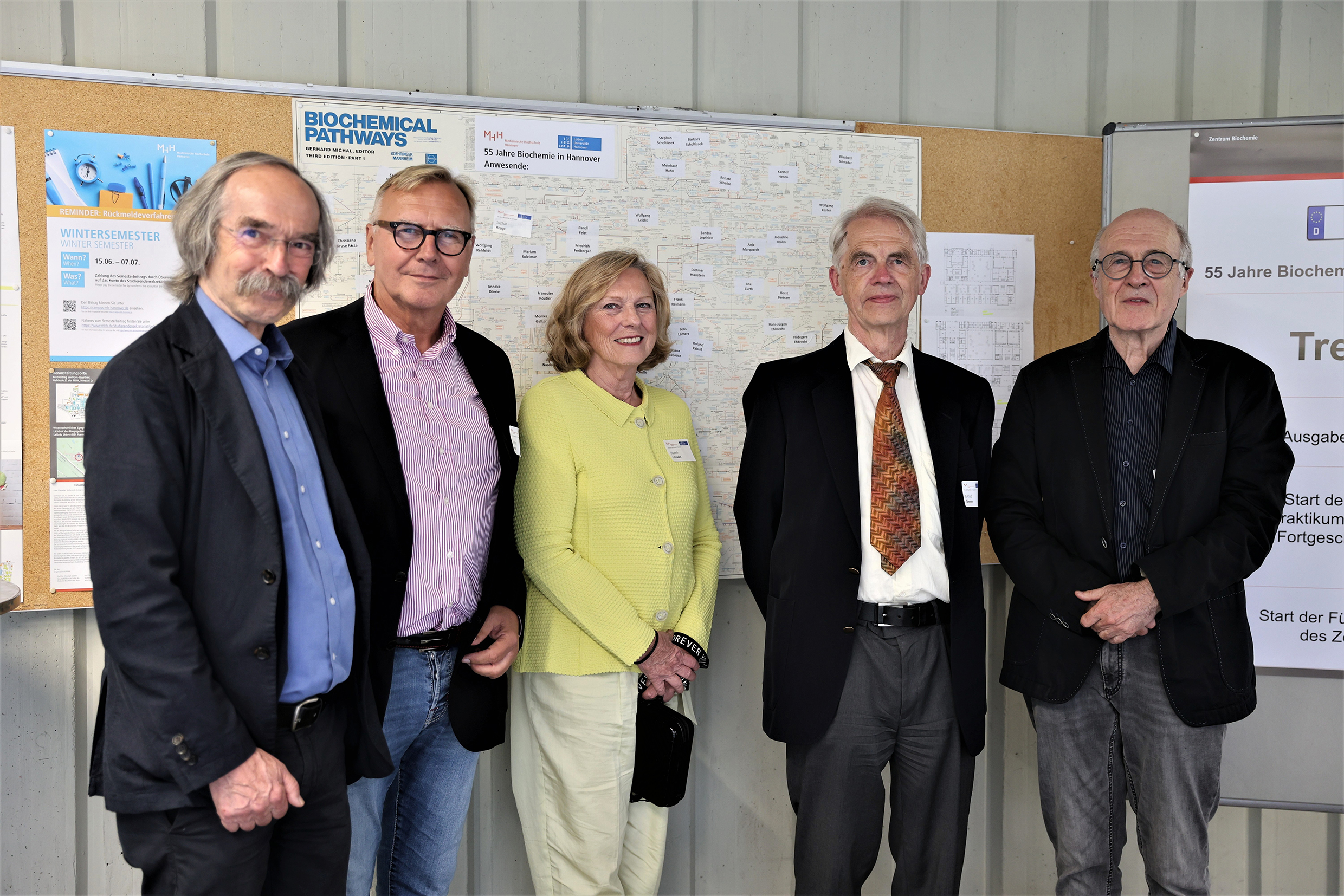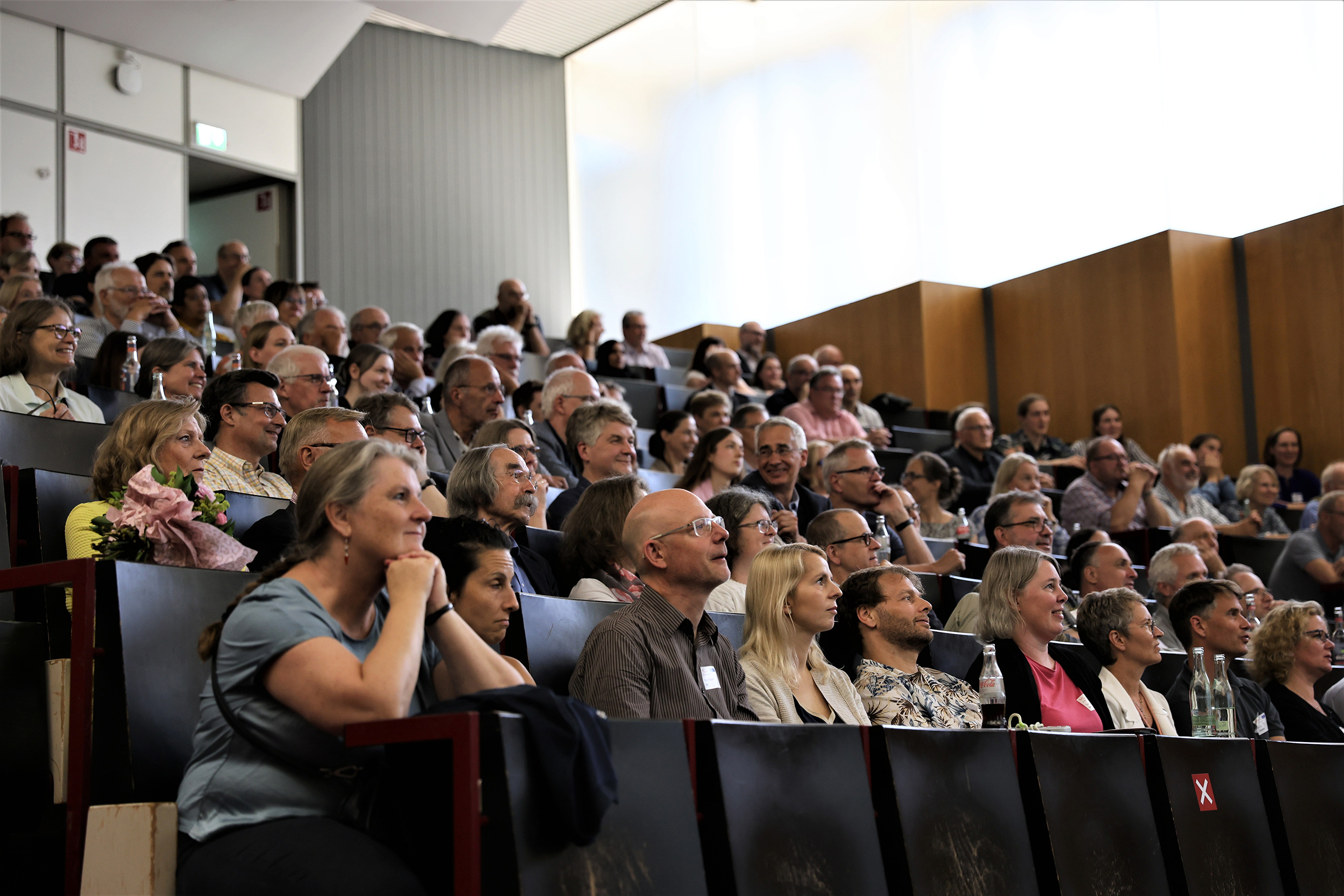The biochemistry programme has been offered at MHH in cooperation with Leibniz University for 55 years. In 1970, Hanover was one of the first locations to introduce this programme in Germany, at that time in cooperation with the University of Veterinary Medicine Hannover. Former graduates looked back on their time at the university during the academic ceremony.

Looking back together on the beginnings of the biochemistry programme at MHH: Prof. Dr. Josef Köhrle, Dr. Karsten Henco, Dr. Elisabeth Schrader, Prof. Dr. Dr. Burkhard Tümmler and Dr. Wolfgang Leicht (from left). Copyright: Gustav Meyer/MHH

A view of the well-filled Lecture Hall D. Copyright: Gustav Meyer/MHH
In the academic year 1970/71, the joint degree programme in biochemistry was launched, with only ten students at the time. They were to acquire comprehensive knowledge of the fundamentals of natural sciences and advanced biochemical research. As early as 1972, the first graduate, Elisabeth Schrader, then still under her maiden name Putze, received her degree. She had begun studying biochemistry in Hanover in the 1966/67 academic year on her own initiative and with the support of its founder, Professor Walter Lamprecht from the newly established Department of Biochemistry at MHH. She initially enrolled in the diploma programme in chemistry at the Technical University of Hanover, which continued in 1968 with the provisional diploma programme in biochemistry.
First female graduate in biochemistry
‘In 1966, women were still very rare in the natural sciences faculty, so my invitation to the welcome ceremony was addressed to Mr E. Putze,’ recalls Elisabeth Schrader. ‘Working hard and fighting to get through my studies at the many locations in and around Hanover took a lot of effort, but I still enjoyed it.’ On her exam day in July 1972, Professor Walther Lamprecht, together with Professor Gerhard Richter from the Botanical Institute of the Technical University of Hanover, praised her for her achievement ‘as the first lady from all German federal states except Tübingen to successfully complete this degree’ (HAZ article from 4 July 1972). Elisabeth Schrader then went on to study medicine at MHH, became the university's occupational physician and was thus able to combine family and work well. She specialised in occupational medicine, where she was and still is a consultant for many companies in Hanover.
From setting up a biochemistry student council
Her fellow student Wolfgang Leicht came to Hanover from southern Germany especially for this, even though there was already a biochemistry degree programme in Tübingen. ‘Unfortunately, the numerus clausus was too high for me, but it didn't exist in Hanover yet. Everything was still in the process of being set up, including the study and examination regulations,’ he recalls of his comparatively uncomplicated admission to the programme. Students also had to help set up the internships, often searching for professors or approaching them directly to ask them to teach them, he explains. When the professors at the TU and MHH were unable to agree on the internships and course content to be specified in the study regulations, Leicht became involved in setting up his own student council and worked on the academic committees. After earning his doctorate in biochemistry, he later went into industry, researching insecticides at Bayer Leverkusen.
From MHH to co-founder of a listed company
Dr Karsten Henco was also one of the first biochemistry students in Hanover. Today, he is one of Germany's best-known scientists in the field of biotechnology and co-founder of Qiagen N.V., a publicly traded provider of sample preparation and testing technologies for molecular diagnostics, academic research, the pharmaceutical industry and applied testing procedures with locations in more than 25 countries. ‘Even back then, I was excited by the idea of contributing to the development of new drugs and therapies through my research – and thus helping many people,’ recalls the 73-year-old. ‘Studying at MHH was already extremely practical back then. We were part of the laboratory group from an early stage and were taught directly by the professors during the practicals,’ he recalls of his biochemistry studies. One of his mentors was later Professor Manfred Eigen, Nobel Prize winner in chemistry and founder of the Max Planck Institute for Biophysical Chemistry in Göttingen. As early as 1982, Henco was recruited by BASF to introduce the new discipline of genetic engineering. Here, he and a research group initiated the development of the rheumatism drug Humira, one of the world's best-selling medicines. He wanted to develop further and later founded his first company, Qiagen. Today, he has made it his mission to support young, innovative life science companies in their start-up phase.
Endocrinology and hormone therapy as a research focus
Professor Dr Josef Köhrle, who still works as a senior professor at the Institute for Experimental Endocrinology at Charité in Berlin, was drawn to science. After graduating with a degree in biochemistry in the early 1970s, he discovered endocrinology and hormone therapy. At MHH, he joined the working group of Professor Dieter Hesch, who at the time headed the Department of Clinical Endocrinology together with Professor Alexander von zur Mühlen.
After a research stay in the USA, Köhrle successfully continued his research work at the Medical Polyclinic of the University of Würzburg. In the early 2000s, he was recruited by the Charité in Berlin. Here, he established a DFG priority programme on selenoproteins and an endocrinology-oriented Research Training Group S. He was involved in a clinical research group on weight regulation and a transregional collaborative research centre on the local effects of thyroid hormones. When Prof. Josef Köhrle looks back today on the ‘very challenging beginnings’ of biochemistry in Hanover in 1970, he could not have wished for better starting conditions: ‘Biochemistry in Hanover was already very interdisciplinary at that time. We had a free choice of lecturers and also of laboratory internships,’ he recalls.
Still active in research at MHH today
Professor Dr Burkhard Tümmler has remained active in research at MHH to this day. He studied biochemistry from 1971 to 1976 and, two years before graduating, also began studying human medicine at the MHH (1974-1981).
Tümmler obtained his doctorate in physical chemistry and human genetics (Dr. rer. nat. in 1979 and Dr. med. in 1984) and habilitated in biochemistry in 1991. From 1993 to 2022, he headed the clinical research group ‘Molecular Pathology of Cystic Fibrosis’ at the Centre for Biochemistry and the Centre for Paediatrics and Adolescent Medicine. Clinically, he has been involved in the care of patients with cystic fibrosis since 1983. At the academic ceremony, he gave a lecture looking back in detail at the development of ‘his’ field of biochemistry.
Text: Bettina Dunker